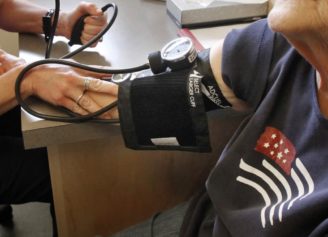A stroke is a devastating illness, and can be the direct consequence of hypertension.
Imagine never again experiencing the simple pleasures of life—things like walking barefoot along the beach, licking an ice cream cone, swimming laps in the pool on a sunny day, baking a favorite pie or buttoning a shirt.
A seemingly insignificant yet deliberate action—swallowing a pill—can prevent a cascade of terrible, life-altering events.
One-third of American adults have high blood pressure, also known as hypertension. Hypertension is blood pressure greater than 140/90. If you consume more than one teaspoon of salt each day, are obese, don’t exercise, drink in excess of two alcoholic drinks daily, and/or have a mother or father with hypertension, you are at risk.
Twenty-five to 30 million Americans with hypertension are on anti-hypertensive medications, but still have blood pressure greater than the goal (140/90). That’s dangerous!
High blood pressure is a silent killer. You feel fine even as damaging changes are happening to your body. Uncontrolled hypertension causes strokes, heart attacks, kidney failure and impotence. Stroke patients can be left with the inability to talk, walk, or eat without assistance.
Hypertension also can cause heart disease that could lead to impotence.
Here’s one more one more sobering fact: high blood pressure renders the kidneys nonfunctional and urine is no longer produced, leaving waste materials in the body without a way to exit. This necessitates hemodialysis (dialysis). Dialysis is a 3-4 hour, three times a week, life-preserving treatment, only reversible with a kidney transplant.
I have heard every excuse in the book for not getting on or staying on anti-hypertensive medications.
“I ran out of medicine.”
“The pills made me feel funny.”
“My blood pressure is only high when I am at the doctor.”
“I am using a home remedy.”
None of these excuses will make much sense to you or your family if you land in the hospital with a stroke or heart attack. Taking anti-hypertensive medicine should be like brushing your teeth; you do it everyday without thinking about it. And, if you have the option of putting your medications on automatic refill, do it, so that you won’t run out. But if you run out of medications while away or after your doctor’s office hours, find a retail health care clinic that will do a one-time refill.
Do not just stop taking your medications!
Remember to talk to your doctor if you experience side effects. Once on medications, check your blood pressure weekly at the supermarket, pharmacy, or local fire station. Write down the numbers and take those to your next doctor’s appointment.
The choice is yours: stroke, heart attack, dialysis, or impotence? Or, take your medicine!
It should be a pretty easy decision.
Be well.
Sylvia E. Morris, MD, MPH, is a board-certified physician in internal medicine and holistic medicine. In addition to her clinical responsibilities, she speaks at many community forums and delivers health awareness presentations. Dr. Morris is active in social networking and has made guest appearances on the Weather Channel’s Weekend View and Atlanta’s Fox 5 News. Tell her what you think on Facebook.


